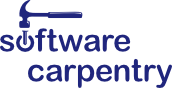Instructor Training: North-West University
Apr 17-20, 2016
9:00 am - 5:00 p.m.
Trainers: Aleksandra Pawlik
Helpers: Anelda van der Walt, Maia Lesosky
Software Carpentry and Data Carpentry's mission is to help scientists and engineers get more research done in less time and with less pain by teaching them basic lab skills for scientific computing. This hands-on two-day workshop covers the basics of educational psychology and instructional design, and looks at how to use these ideas in both intensive workshops and regular classes. The workshop is a mix of lectures and hands-on lessons where you practice giving a short lesson using approaches learned and implement some of the teaching techniques which we will discuss. This is training for teaching, not technical training; you do not need any particular technical background, and we will not be teaching that. This workshop is based on the constantly revised and updated curriculum.
Who: The course is aimed at everyone who is interested in becoming a better teacher. In particular, this training is aimed at those who want to become Software and Data Carpentry instructors, run workshops and contribute to the Carpentry training materials. You don't currently have to be an instructor or a teacher to attend this workshop, but you do need to be willing and committed to becoming one and to improving your teaching techniques.
Application details:
- the lessons avalable at http://software-carpentry.org/lessons/
and http://www.datacarpentry.org/lessons/
- the FAQs
Where: Potchefstroom Campus of North-West University. Get directions with OpenStreetMap or Google Maps.
Requirements: Participants should bring a laptop that is Internet connected and has a functioning browser. If you have it, a device for recording audio and video (mobile phones and laptops are OK) is useful as throughout the two days, we are going to record one another teaching in pairs or threes. It does not have to be high-quality, but it should be good enough that you can understand what someone is saying.
Please also read the Preparation section below. You will also receive some further information before the workshop so please check your email.
All participants are also required to abide by Software Carpentry's Code of Conduct.
Contact: Please email eresearch@nwu.ac.za for more information.
Schedule
Sunday, 17th April, 2016
| 18:00 | Registration in the foyer |
| 18:30 | Dinner |
| 19:30 | Participant's presentations |
| before 21:00 | Close |
Monday, 18th April 2016
| 08:30 | Arrival and welcome |
| 09:00 | Introduction to study groups |
| 09:45 | Topics for study groups |
| 10:15 | Setting up study groups |
| 10:15 | Recap and discussion |
| 10:30 | Coffee break |
| 11:00 | Developing study groups |
| 12:00 | Mozilla Science Lab Study Groups by Aurelia Moser |
| 12:30 | Lunch break |
| 13:30 | Instructor Training overview: key concepts |
| 13:45 | Formative vs. summative assessment |
| 15:00 | Coffee break |
| 15:30 | Teaching as performance art |
| 16:30 | Wrap-up |
Tuesday, 19th April 2016
| 08:30 | Recap and homework review |
| 09:00 | Concept maps |
| 10:00 | Cognitive load theory and faded examples |
| 10:30 | Coffee break |
| 11:00 | Reversed instructional design & Bloom's taxonomy |
| 11:30 | Learning objectives |
| 12:00 | Motivation and demotivation. Diversity. Indifference. |
| 12:30 | Lunch break |
| 13:30 | Teaching as performance art - part 2 |
| 14:30 | Setting up and running a workshop - part 1 |
| 15:00 | Coffee break |
| 15:30 | Setting up and running a workshop - part 2 |
| 16:00 | Introduction to Data Carpentry by Tracy Teal |
| 16:45 | Wrap-up |
Wednesday, 20th April, 2016
| 08:30 | Live coding and active learning |
| 09:00 | Live coding exercise |
| 09:30 | Coffee break |
| 10:00 | Live coding exercise - continued |
| 10:30 | Training materials - how to contribute |
| 11:30 | Next steps |
| 12:00 | Close |
Etherpad: http://pad.software-carpentry.org/2016-04-17-instructor-training-nwu.
We will use this Etherpad for chatting, taking notes and sharing URLs.
Syllabus
Please see this website for the course material, or follow the links below:
- Introduction
- Terms
- Mental Models
- Lesson Study
- Mapping Expertise
- Managing Memory
- Lesson Design
- Teaching Practices
- Motivation
- Demotivation
- The Carpentries
Preparation
- Please read Porter et al's "Success in Introductory Programming: What Works?", which is a good recent summary of results specific to teaching programming, and Mark Guzdial's "Top 10 Myths About Teaching Computer Science", which is a nice overview of things that are not true, but are widely believed.
- Please also pick up a copy of "How Learning Works", which is currently the best summary of research in education. It is full of useful insights, and a lot of how we teach is based on the findings it reports.
- Finally, please go to Software Carpentry's lessons page and Data Carpentry's lessons page to see what is currently taught by each.
If you are interested in doing more reading, Huston's "Teaching What You Don't Know" is a lot of fun - many will recognize themselves in these stories. Past participants have also enjoyed "Building a Better Teacher", which is a well-written look at why educational reforms in the past 50 years have mostly failed, and covers what we should be doing instead.

